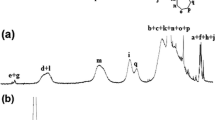Summary
Biodegradable poly(aspartic acid) (PASP) containing octadecyl chain grafts has been synthesized by thermal polycondensation of aspartic acid, aminolysis by octadecylamine, and followed by hydrolysis of remaining succinimide in polymer backbone. The sonicated suspension formed self-aggregates in aqueous solution. Size exclusion chromatography and dynamic light scattering indicated that self-aggregates became compact and particle size was reduced as increasing the amount of substituted octadecyl chains. In the case of low degree of substitution, self-aggregates assembled loosely due to low hydrophobic interaction. In the concentration range of 0.05–1.0%, the stability of aggregates was maintained due to effective hydrophobic interaction and electrostatic repulsion. Below pH 3.2, macroscopic phase-separation appeared in aqueous solution due to attraction of protonated PASP backbone.
Similar content being viewed by others
Author information
Authors and Affiliations
Additional information
Received: 3 April 2000/Revised version: 6 July 2000/Accepted: 7 July 2000
Rights and permissions
About this article
Cite this article
Kang, H., Shin, MS., Kim, JD. et al. Self-aggregates of poly(aspartic acid) grafted with long alkyl chains. Polymer Bulletin 45, 39–43 (2000). https://doi.org/10.1007/s002890070054
Issue Date:
DOI: https://doi.org/10.1007/s002890070054




